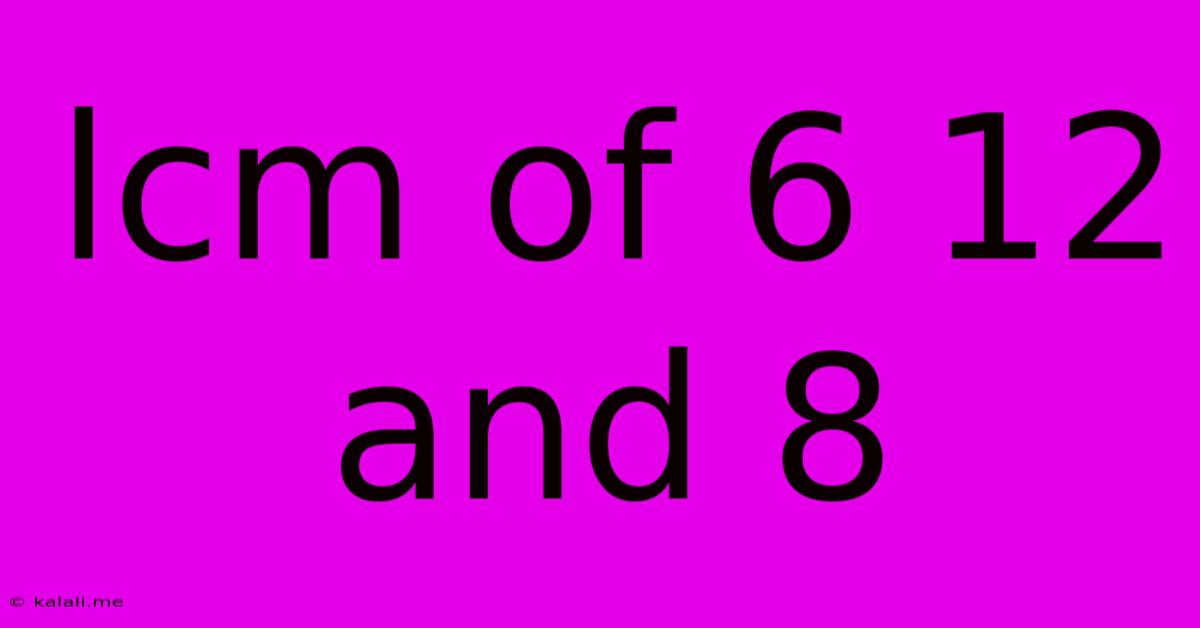Lcm Of 6 12 And 8
Kalali
Jun 15, 2025 · 2 min read

Table of Contents
Finding the Least Common Multiple (LCM) of 6, 12, and 8
This article will guide you through the process of calculating the Least Common Multiple (LCM) of 6, 12, and 8. Understanding LCM is crucial in various mathematical applications, from simplifying fractions to solving problems involving cyclical events. We'll explore different methods to find the LCM, ensuring you grasp the concept and can apply it easily. This includes prime factorization and the listing method, providing a comprehensive understanding of this fundamental mathematical concept.
What is the Least Common Multiple (LCM)?
The Least Common Multiple (LCM) is the smallest positive integer that is a multiple of two or more numbers. In simpler terms, it's the smallest number that all the given numbers can divide into evenly. Finding the LCM is a key skill in arithmetic and algebra.
Method 1: Prime Factorization
This method is particularly efficient when dealing with larger numbers. Let's break down 6, 12, and 8 into their prime factors:
- 6: 2 x 3
- 12: 2 x 2 x 3 = 2² x 3
- 8: 2 x 2 x 2 = 2³
To find the LCM, we identify the highest power of each prime factor present in the numbers:
- The highest power of 2 is 2³ = 8
- The highest power of 3 is 3¹ = 3
Now, multiply these highest powers together:
8 x 3 = 24
Therefore, the LCM of 6, 12, and 8 is 24.
Method 2: Listing Multiples
This method is straightforward for smaller numbers. List the multiples of each number until you find the smallest common multiple:
- Multiples of 6: 6, 12, 18, 24, 30, 36...
- Multiples of 12: 12, 24, 36, 48...
- Multiples of 8: 8, 16, 24, 32, 40...
The smallest number that appears in all three lists is 24. Therefore, the LCM of 6, 12, and 8 is again 24.
Understanding the Application of LCM
The LCM has practical applications in various scenarios:
- Fraction Addition and Subtraction: Finding a common denominator for fractions often involves calculating the LCM of the denominators.
- Scheduling Problems: Determining when events will occur simultaneously (e.g., buses arriving at a stop) often utilizes the LCM.
- Measurement Conversions: Converting units of measurement can sometimes involve the LCM.
Conclusion
Finding the LCM of 6, 12, and 8, whether through prime factorization or listing multiples, consistently results in the answer 24. Understanding both methods empowers you to tackle LCM problems with confidence, regardless of the numbers involved. Remember to choose the method that best suits the numbers you're working with. The prime factorization method is generally more efficient for larger numbers, while listing multiples is easier for smaller numbers.
Latest Posts
Latest Posts
-
Levels Of Processing Model Of Memory
Jun 15, 2025
-
What Color Of Light Is Least Effective In Driving Photosynthesis
Jun 15, 2025
-
Low Medium And High Voltage Ranges
Jun 15, 2025
-
Which Of The Following Is Not A Product Of Fermentation
Jun 15, 2025
-
Difference Between American And Indian Culture
Jun 15, 2025
Related Post
Thank you for visiting our website which covers about Lcm Of 6 12 And 8 . We hope the information provided has been useful to you. Feel free to contact us if you have any questions or need further assistance. See you next time and don't miss to bookmark.